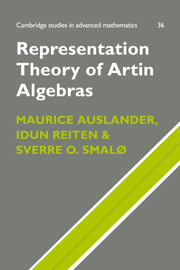Book contents
- Frontmatter
- Contents
- Introduction
- I Artin rings
- II Artin algebras
- III Examples of algebras and modules
- IV The transpose and the dual
- V Almost split sequences
- VI Finite representation type
- VII The Auslander–Reiten-quiver
- VIII Hereditary algebras
- IX Short chains and cycles
- X Stable equivalence
- XI Modules determining morphisms
- Notation
- Conjectures
- Open problems
- Bibliography
- Relevant conference proceedings
- Index
XI - Modules determining morphisms
Published online by Cambridge University Press: 11 May 2010
- Frontmatter
- Contents
- Introduction
- I Artin rings
- II Artin algebras
- III Examples of algebras and modules
- IV The transpose and the dual
- V Almost split sequences
- VI Finite representation type
- VII The Auslander–Reiten-quiver
- VIII Hereditary algebras
- IX Short chains and cycles
- X Stable equivalence
- XI Modules determining morphisms
- Notation
- Conjectures
- Open problems
- Bibliography
- Relevant conference proceedings
- Index
Summary
The basic premise of this book has been that one should study the morphisms between modules as a way of studying the modules themselves. In this enterprise, two special types of morphisms have played a particularly important role, split epimorphisms (monomorphisms) and right (left) almost split morphisms. Whether or not a morphism ƒ : B → C is one of these types is determined by which morphisms X → C for arbitrary X can be factored through ƒ. In fact, this situation is not as special as it seems since all right minimal morphisms ƒ: B → C are determined by which morphisms X → C can be factored through ƒ. A careful analysis of this observation leads to the notion of morphisms determined by modules, in terms of which a classification theorem for right minimal morphisms is given. We also get existence theorems for morphisms to an indecomposable module C which contain the existence of minimal right almost split morphisms as a special case.
In Chapter V we introduced the notion of rigid exact sequences and showed that split and almost split sequences are rigid. We use here our classification of morphisms to study further when exact sequences are rigid. In this connection, we introduce the notion of modules with waists, a notion we further exploit in studying when almost split sequences have indecomposable middle terms. This problem was also first discussed in Chapter V.
- Type
- Chapter
- Information
- Representation Theory of Artin Algebras , pp. 365 - 405Publisher: Cambridge University PressPrint publication year: 1995

